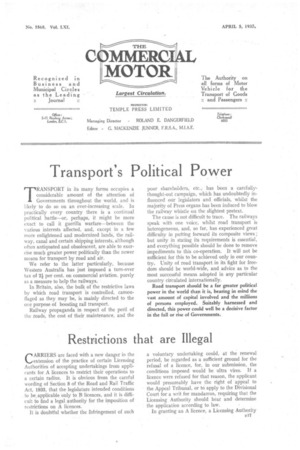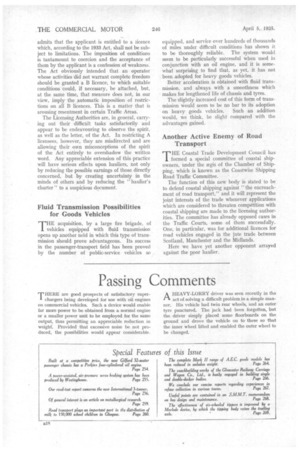Restrictions that are Illegal
Page 35

Page 36

If you've noticed an error in this article please click here to report it so we can fix it.
CARRIERS are faced with a new danger in the extension of the practice of certain Licensing Authorities of accepting undertakings from applicants for A licences to restrict their operations to a certain radius. It is obvious from the careful wording of Section 8 of the Road and Rail Traffic Act, 1933, that the legislature intended conditions to be,applicable only to B licences, and it is difficult to find a legal authoritY for the imposition of restrictions on A licences.
It is doubtful whether the infringement of such a voluntary undertaking could, at the renewal period, be regarded as a sufficient ground for the refusal of a licence, for, in our submission, the conditions imposed would be ultra vires. If a licence were refused for that reason, the applicant would presumably have the right of appeal to the Appeal Tribunal, or to apply to the Divisional Court for a writ for mandamus, requiring that the Licensing Authority should hear and determine the application according to law.
In granting an A licence, a Licensing Authority rs17 admits that the applicant is entitled to a licence which, according to the 1933 Act, shall not be subject to limitations. The imposition of conditions is tantamount to coercion and the acceptance of them by the applicant is a confession of weakness. The Act obviously intended that an operator whose activities did not warrant complete freedom should be granted a B licence, to which suitable conditions could, if necessary, be attached, but, at the same time, that measure does not, in our view, imply the automatic imposition of restrictions on all B licences. This is a matter that is arousing resentment in certain Traffic Areas.
The Licensing Authorities are, in general, carrying out their difficult tasks satisfactorily and appear to be endeavouring to observe the spirit, as well as the letter, of the Act. In restricting A licensees, however, they are misdirected and are allowing their own misconceptions of the spirit of the Act entirely to overshadow the written word. Any appreciable extension of this practice will have serious effects upon hauliers, not only by reducing the possible earnings of those directly concerned, but by creating uncertainty in the minds of others and by reducing the " haulier's charter" to a suspicious document.
Fluid Transmission Possibilities for Goods Vehicles
E acquisition, by a large fire brigade, of vehicles equipped with fluid transmission opens up another neld in which this type of transmission should prove advantageous. Its success in the passenger-transport field has been proved by the number of public-service vehicles so equipped, and service over hundreds of thousands of miles under difficult conditions has shown it to be thoroughly reliable. The system would seem to be particularly successful when used in conjunction with an oil engine, and it is somewhat surprising to find that, as yet, it has not been adopted for heavy goods vehicles.
Better acceleration is obtained with fluid transmission, and always with a smoothness which makes for lengthened life of chassis and tyres.
The slightly increased cost of this form of transmission Would seem to be no bar to its adoption on heavy goods vehicles. Such an addition would, we think, be slight Compared with the advantages gained.
Another Active Enemy of Road Transport
rr HE Coastal Trade Development Council has formed a special committee of coastal shipowners, under the xgis of the Chamber of Shipping, which is known as the Coastwise Shipping Road Traffic Committee.
The function of this new body is stated to be to defend coastal shipping against " the encroachment of road transport," and it will represent the joint interests of the trade whenever applications which are considered to threaten competition with coastal shipping are made to the licensing authorities. The committee has already opposed cases in the Traffic Courts, some of them successfully. One, in particular, was for additional licences for road vehicles engaged in the jute trade between Scotland, Manchester and the Midlands.
Here we have yet another opponent arrayed against the poor haulier.




































































































